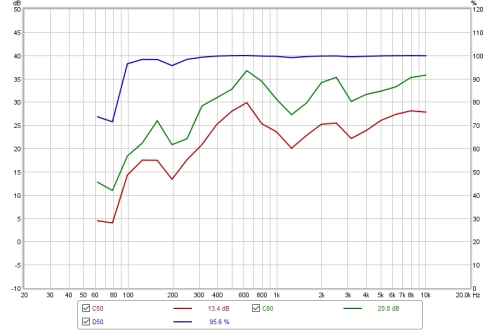
The C50, C80 and custom clarity and D50 definition curves at each octave or one-third octave filter centre frequency are displayed on this graph. See below for descriptions of each of these parameters.

The control panel for the Clarity graph has these controls:

The band selector chooses either octave or one-third octave filtered results. The filtering settings used are those on the RT60 graph.
A custom clarity trace can be generated with the division between early and late selected between 1 and 99 ms. The typical 50 and 80 ms times are suitable for large spaces, but for smaller rooms 20 ms or even lower may be more appropriate.
The plot can show horizontal bars centred on each filter frequency and spanning the filter's bandwidth, or lines joining the filter centre frequencies, according to the Use bars on plot control setting.
The Trace options button brings up a dialog that allows the colour and line type of the graph traces to be changed. If a change is made it will be used for all measurements shown on this graph. Traces can also be hidden, which will remove them from the graph and from the graph legend.
The clarity measures available are:
The parameter values (RT60 and clarity) for the current measurement can be written to a text file using the File → Export → RT60 data as text menu entry.